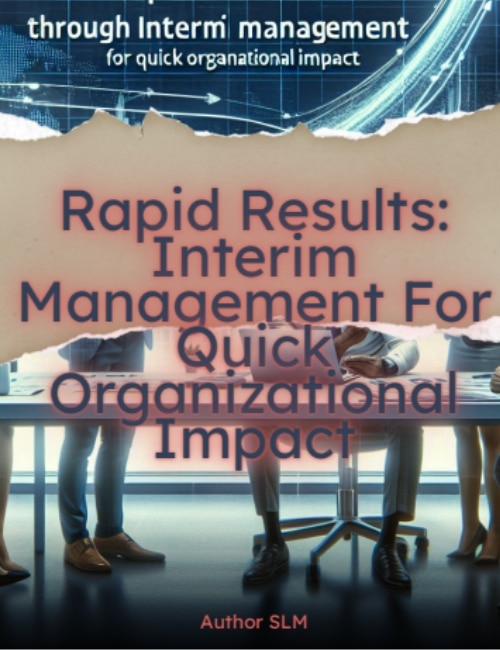An interim manager or a consultant for your company
Firstly, does your company have a project to manage or a role to fill?
Not all permanent managers can work in projects, but conversely, change management is the life-blood of interim managers.
If you have a project then your company team should prepare a brief, which may include a scope of work, the delegation of responsibilities, milestones, planning, KPIs and budget. It is normal practice for the interim manager to confirm and expand the brief after being assigned.
If you have a role to fill then an interim manager can still help your company as their vast experience and availability can assure that they become operational quicker than a permanent. A typical interim manager is 43 years old, with more than 8 years of experience as an interim professional and works at C-level. So they have a track record of excellent project management and can quickly hit the ground running. A permanent manager may not be as responsive and indeed may be still focused on finding a permanent role
What is an Interim Manager?
An interim manager is a senior-level professional who steps into a company on a temporary basis, usually in times of transition, crisis, or significant change. Unlike permanent employees, interim managers bring specialized expertise and leadership skills for a set period to solve specific challenges.
Key Characteristics of an Interim Manager:
- Hands-on leadership: Interim managers often take on operational roles, acting as executives or project leaders to implement strategies.
- Decision-making authority: They have the power to make key decisions on behalf of the company and drive immediate results.
- Short-term focus: Their objective is to achieve rapid, tangible outcomes, whether it’s managing a crisis, steering a transformation, or filling a leadership gap.
- Highly adaptable: Interim managers are usually highly experienced and can quickly integrate into the company culture, assess the situation, and take action without long onboarding periods.
When to Hire an Interim Manager:
- You need an executive leader quickly (e.g., filling a vacancy for a CEO, CFO, or other senior roles).
- The company is going through a merger, acquisition, or restructuring.
- You are facing a crisis and need an experienced leader to manage immediate issues.
- The business is entering a new market or launching a major project that requires temporary senior leadership.
What is a Consultant?
A consultant, on the other hand, provides expert advice to businesses but does not typically take on an operational or leadership role within the organization. Consultants work externally to assess problems, develop strategies, and offer recommendations based on their expertise.
Key Characteristics of a Consultant:
- Advisory role: Consultants focus on analyzing a company’s challenges and providing solutions without directly implementing those solutions.
- Strategic perspective: They often bring a wide range of industry insights and best practices from working with various clients.
- Project-based work: Consultants are generally brought in to address specific projects, such as improving efficiency, launching a new product, or entering a new market.
- Objective perspective: As external advisors, consultants can offer unbiased insights, helping companies see things from a fresh angle.
When to Hire a Consultant:
- You need expert advice on a specific issue or challenge.
- The company requires an outside perspective to assess internal problems.
- You are developing a long-term strategy and need a specialist’s insights.
- A specialized project requires a particular skill set that your internal team lacks.
Key Differences Between Interim Managers and Consultants
While both roles bring significant value, the primary difference between an interim manager and a consultant is their approach and level of involvement.
| Interim Manager | Consultant |
|---|---|
| Acts as part of the organization | Works externally |
| Takes operational and leadership roles | Provides advice and recommendations |
| Focuses on short-term, hands-on results | Focuses on long-term strategic insights |
| Can take on decision-making authority | Leaves implementation to the company |
Which One is Right for Your Company?
- For immediate leadership or crisis management: If your business is in a state of flux, an interim manager is the better choice. Their ability to step in and make decisions can stabilize your company and guide it through tough times.
- For expert advice or strategy development: When your company needs specialized knowledge, a consultant offers the external perspective necessary for crafting effective strategies without getting involved in daily operations.
Conclusion
Both interim managers and consultants play vital roles in helping businesses thrive, but the right choice depends on your company’s current needs. If you need a hands-on leader to steer your company through a challenging period, an interim manager can make an immediate impact. If you’re looking for expert advice and long-term strategic insights, a consultant can provide the guidance you need.
Evaluate your current situation, and choose the option that aligns with your goals. Whether you need leadership on the frontlines or strategic advice from behind the scenes, external expertise can be the key to unlocking your business’s potential.















